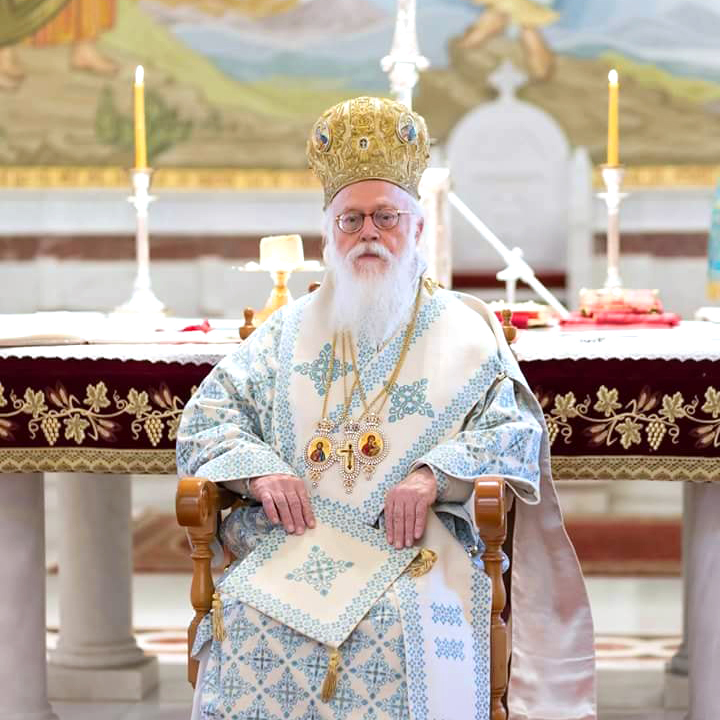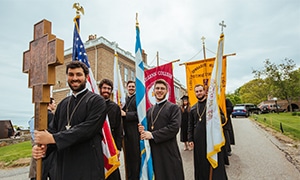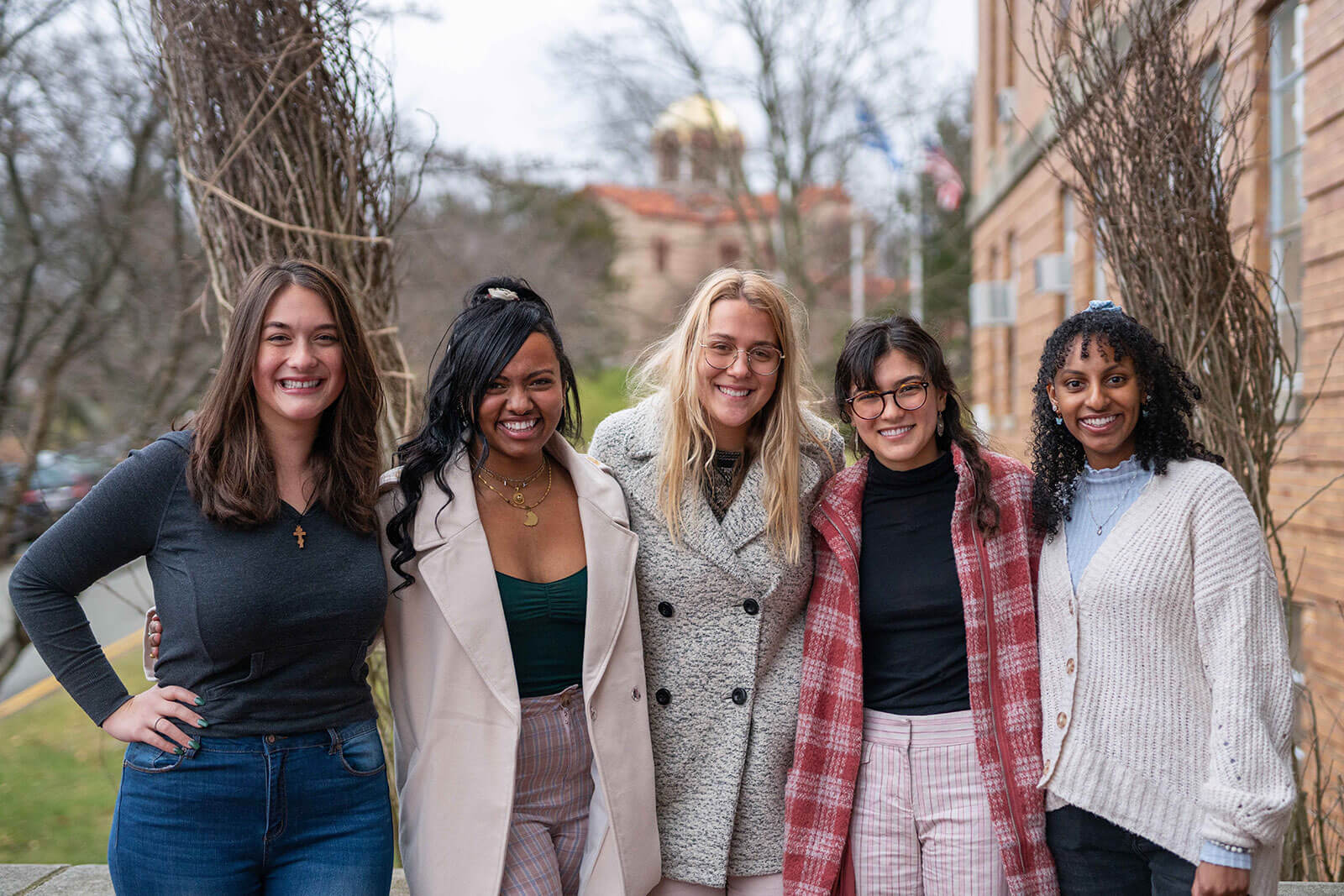MY SPIRITUAL FATHER AND MENTOR ARCHBISHOP ANASTASIOS OF ALBANIA

Authored by: Fr. Luke A. Veronis, Director for the Missions Institute of Orthodoxy Christianity, Adjunct Instructor at Holy Cross Greek Orthodox School of Theology.
Every person in front of you is the most important person and the most important time is now. Archbishop Anastasios reflects this worldview. He has the charismatic gift to make whomever he is speaking with feel cherished and loved. He sees the image of God in whomever he encounters and responds to them in the present moment with love.
One of many fond memories I have of the Archbishop is when my wife, Presbytera Fotini, had a medical emergency in Albania in 1996. The post-communist medical system in Albania was a broken mess and we learned that my wife needed emergency surgery. As young American missionaries working under Archbishop Anastasios, we were idealistic and excited about our mission, yet we were afraid and uncertain with this unexpected event. It was 11:00 at night in the hospital and the doctors were deciding whether to do emergency surgery early the next morning, when in walks Archbishop Anastasios to visit us. His compassion and concern radiated from his smile and gentle words. Not only did he bring his comforting presence, but he also was carrying clean sheets and a pillow for the hospital bed. He thought about a basic necessity that we didn’t know we even needed. He then made arrangements with Olympic Airlines to fly us out early the next morning so that we could have the surgery done in Athens.
This is the compassionate and caring spirit of Archbishop Anastasios. He took similar special personal care for us when my wife had two miscarriages and we lost our babies, when my father in-law died at 62 years old, and when our apartment caught fire and we lost many of our possessions. He treated us like his beloved children. In fact, this is how he treats everyone he encounters.
I remember driving him to some remote villages in Western Kenya as well as traveling with him in the mountain villages of Albania. Whomever he met, even the most simple and illiterate villager, he embraced and made them feel special. Years later, I traveled with the Archbishop to London and New York when he was surrounded by world renowned leaders and wealthy power brokers at various conferences or events. I noticed how he treated these influential people the same way he treated the African or Albanian villagers. He shows no partiality to the rich or powerful but treats whomever he meets in a way that makes each person feel special and loved. Each person is a child of God and he sees the beauty in everyone.
The direction of my life changed when I met Archbishop Anastasios in Nairobi, Kenya during the Summer of 1987. I was in my last year at university studying mathematics when I went on the first Orthodox mission trip from the United States. The Archbishop creatively invited a group of 25 young Greek Americans to build a church in the bush country of Kenya. It was the first time that such a unique mission happened in our Orthodox Church. That experience changed the path of my life from a future in mathematics to instead follow the priesthood and missionary service.
I heard about Archbishop Anastasios from my father, Father Alexander Veronis, who got to know the young theologian, Anastasios, while studying in Athens in 1960. My father made a
prescient personal journal entry on the day of Anastasios’ ordination to the diaconate, “Today I was at the ordination of a very special man. He will do great things for the church!”
Little could my father imagine that three decades later, this charismatic preacher would become his son’s spiritual father and mentor. I lived with Archbishop Anastasios serving in the Church of East Africa for one year, and then my Presbytera and I served for ten and a half years in post communist Albania during the most difficult years of this mission. I witnessed the amazing miracles that Archbishop Anastasios did throughout his life.
The first article I ever read by the Archbishop was called “The Forgotten Commandment.” It was based on a talk the young preacher and theologian offered at the University of Athens in 1959, highlighting how the Orthodox Church needed to rediscover the last commandment of Christ to “go forth and make disciples of all nations.” He envisioned creating a pan-Orthodox Mission Center. Some of the professors at the university told this idealistic theologian that it would take a miracle for his vision to become a reality. To which the young Anastasios responded, “Well, we believe in a God of miracles.” And under his leadership and in his life of 95 years, God revealed those miracles!
When I was a young man reflecting on the meaning of life, the Archbishop challenged me by asking, “Is this Gospel really something that can be lived? This is the question many skeptics ask today. Yet, missionaries offer an answer. The ontological question is to be, not to do. The witness of our life is what is most important. This is what we offer to the world.”
Well, I saw how the Archbishop offered his life to the world. One of the greatest lessons he taught me was that “the opposite of love is the ego.” The ego is inward turned and tries to keep the focus on oneself. The archbishop is the antithesis of Ego and exemplifies “Divine Love.” Divine Love goes outward and embraces everyone – the stranger, the foreigner, the sinner, the lost. The ego uses fear to separate us from the other. Divine Love helps us to see God’s image and likeness in every person and compels us to love them. This egocentric worldview can be individual as well as communal. The Archbishop challenged the Church when it acted in an inward-turned manner, only concerned about itself and its own people. “The one, holy, catholic and apostolic Church,” the Archbishop highlighted, “must always be turned outward, loving the entire world. A Church without mission is not the Church.”
Another lesson I learned was that “the oil of religion should never be used to ignite the fires of hatred but should be used to soothe and heal the wounds of others.” During the Kosovo War, when the world tried to portray the violence of that region as a religious conflict between Serbian Orthodox and Albanian Muslims, the Archbishop showed how the Church needs to be a voice of peace that seeks to heal the wounds of others. He mobilized the Orthodox Church of Albania to set up refugee camps for the half million, mostly Muslim refugees who flooded into the country. He emphasized that we always need to help those who are suffering, regardless of who they may be. Thus, he offered to the Islamic community in Kosovo to rebuild one of the mosques that had been destroyed by the Serbians, while he also offered to rebuild one of the Serbian Orthodox churches that had been destroyed by the Albanians.
During that war, he told me to take students from our Resurrection of Christ Theological Academy and from the Orthodox students at Tirana University to visit the refugee camps and offer whatever help we could. One student asked him, “Should we wear our crosses to show these Muslim refugees we are Christian?” To which the Archbishop responded, “Wear your cross under your shirt but reflect the life of the cross to the refugees – a life of sacrificial love and service.” Thus, we reached out and became friends with many Muslim refugees, and they saw the witness of true Christian love. One refugee, with the name Ramadan, told me after the war that despite all the horrible violence he experienced, he had hope for the future for Albanians and Serbians, for Muslims and Christians, because of the love he witnessed in the refugee camp of our Church.
Archbishop Anastasios preached, “A Christian should never have enemies. The Church has no enemies. Never call someone a bad communist, a bad atheist, a bad “whatever.” All people have the image of God in them. They are all children of God and thus they are our brothers and sisters. We must love them all.”
I remember in the 1990s when some of the traditional Orthodox in Albania were hesitant and suspicious when former communists or people from Muslim families came to the church. Thousands of these people were baptized and some even became priests and bishops. The first Albanian deacon who served the Archbishop came from a family of Muslim tradition. When others questioned the Archbishop, he repeated how in Christ people become a new creation. We welcome all. We love all. We have no enemies.
There used to be many Gypsies who sat outside the Annunciation Cathedral in Tirana and begged for help. The Archbishop encouraged the youth of the Church to befriend these people. And we did. We invited them to our youth center. We learned their names. We visited them in their homes. And eventually, some of them wanted to be baptized. When I told the Archbishop about their baptisms, he was very happy but he warned me, “Not everyone will be happy. Some people do not want Gypsies to enter our church. Yet, we welcome all people and rejoice with them as our brothers and sisters in Christ.”
Throughout his life, the Archbishop has faced great challenges and difficulties. In the early years in Albania, the Archbishop lived in a simple little apartment and the Archdiocese was a small four-room apartment. Food was scarce. Electricity could go out at any time throughout the day. We faced security dangers. Life was difficult in the early 1990s. In 1994, the government tried to pass a new constitution that would have kicked the Archbishop out of the country because of his Greek identity. Everyone in the church leadership was on edge during this uncertain time. Yet, the Archbishop remained the constant calm influence on us all. He always radiated what the Apostle Paul calls “the peace of God that passes all understanding” (Philippians 4:7). He never feared anything or anyone.
He wasn’t afraid even with the violence and chaos that ensued in 1997 when the entire country fell into anarchy and all the police and army disappeared. All the foreign embassies evacuated their citizens. Yet, the Archbishop and some of us stayed in Albania knowing that we could not leave the people in the midst of this terrible crisis. Even though the Archbishop’s life was threatened, he never feared or backed down because he trusted in God. And in the midst of that chaos, the Church responded with aid to tens of thousands of families who suffered during the months of this turmoil.
Archbishop Anastasios would often recall the lesson he learned when he was a deacon, on retreat in the monastery of Saint John the Divine on Patmos, right before his ordination to the priesthood. Back then, he wrestled with the decision to go to Africa as a missionary or to stay in Greece. Although most people were telling him he must stay in Greece, he learned to trust in God’s Providence. “God is enough! Or is God enough? What God do we believe in if we think He is not enough? Is it the God who created the universe, who has intervened throughout history, who became incarnate in the person of Jesus Christ? If this is the God we believe in, then He is enough for every situation and difficulty of life. We can trust Him. If God is enough, then go to Africa. If God is not enough, then what God do we believe in?”
The Archbishop applied this lesson throughout his life. He decided to go to Africa and celebrated his first Divine Liturgy in Kampala, Uganda in 1964 right after his ordination to the priesthood. He remembered these words when he returned as the Archbishop of East Africa in 1981 for ten years. And he recalled this lesson when he was 62 years old and asked by Ecumenical Patriarch Demetrios to go to Albania after the dark years of communism. At a time when others think of retirement, the Archbishop accepted his greatest challenge – to go to the only country in the world where all religion was forbidden for 23 years and resurrect an ancient Church. He preached to a generation of people who knew nothing about God. He overcame the suspicions and skepticism of the Albanians who were uncertain about a Greek hierarch coming to Albania. And he established the Orthodox Church of Albania for all people – Albanians, Greeks, and Vlachs.
Another important lesson I learned from the Archbishop was that we must always remain humble children of God. When he became the Bishop of Androusa and a Professor at the University of Athens in 1972, he realized the danger of these two prestigious positions. Yet he vowed that instead of acting as a bishop and professor, he would always remain a deacon who serves others and a student who is constantly learning. He told me, “There is always something to learn, no matter where we go, and no matter with whom we meet. From Africa, I learned an important lesson for Albania. Respect all that is good wherever you go, and don’t think you know better than others. Don’t try to impose your own culture on others. Offer what is best from one’s own culture, but respect and learn from what is good from theirs.”
The Archbishop explained to me “My theological position has always been to live the mystery of the one, holy catholic and apostolic church. To live the mission of the church with its proper universal and eschatological perspective. To live the life of the cross always with the hope of the resurrection.”
Cross and Resurrection summarize the life and ministry of Archbishop Anastasios. He accepts whatever cross God gave him in life and then proclaims the Good News of the Risen Christ and lives in the light and hope of His Resurrection every day. The first words he learned in Albanian were “Krishti u Ngjall.” Christ is Risen! And everything he has done in Albania, along with his witness in Africa as well as to the entire world, has been an attempt to bring the light of the Risen Christ to a world of darkness.
I conclude with one of the hymns that the Archbishop always loved to sing with the people:“Who is so great a God as our God, You are the God of wonders.” (Τίς Θεὸς μέγας, ὡς ὁ Θεὸς ἡμῶν; σὺ εἶ ὁ Θεός, ὁ ποιῶν θαυμάσια μόνος.) Archbishop Anastasios has been an ambassador of Christ, acting as an instrument in the Lord’s hands bringing about the wonders of God in Albania, Greece, Africa, and throughout the world.
 MyHCHC
MyHCHC



